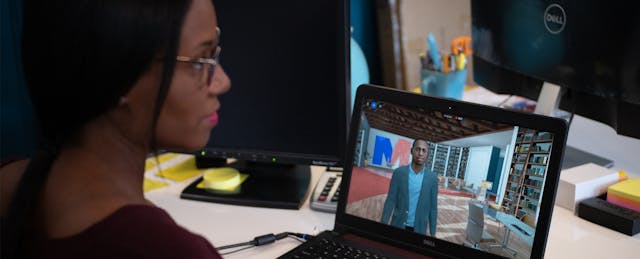There are usually a few nervous giggles when teachers join their first classroom simulation from Mursion, a virtual reality training provider. But CEO Mark Atkinson says the snickers swiftly dissolve into focus as educators get absorbed into what feels like a real-life classroom situation.
Mursion does something no other VR training company does: include live “Sim Specialists” in each training session. These actors—who can see and hear the teacher—provide live dialogue from student avatars representing various personalities and abilities. The result is the convincing illusion that teachers are in a real classroom interacting with actual students who interrupt, play on their phones and react to everything the teacher says and does.
Atkinson calls this a “human-in-the-loop” approach to VR learning. He says it feels authentic and creates lasting learning that teachers can bring to the classroom.
Launched in 2015, leveraging technology developed by the University of Central Florida project, Mursion was designed to help pre-service teachers learn to teach special needs students. Today, universities and districts like Aurora Public Schools and Orange County Public Schools use Mursion to train teachers and administrators on teacher effectiveness, learner outcomes and education leadership. Mursion has even branched out to offer immersive training in the corporate, health care, finance and hospitality sectors.
Here, Atkinson shares more about how Mursion works, why this particular blend of VR and live actors is so effective and which professional skills are in highest demand. He also sneaks in a few tips for edtech startups seeking to increase investments and grow their companies.
EdSurge: What led Mursion to the model of blending live actors and classroom simulations for training?
Atkinson: It’s often impossible in education programs to design enough authentic clinical experiences to prepare teacher candidates for the kinds of challenges they’ll face in the classroom.
Mursion’s answer to that problem came about thanks to Orlando’s robust simulation and performance communities. The US Military’s Central Command (“CENTCOM”) is based there. Lockheed Martin, which builds flight simulators, is there and funded some of Mursion’s initial research at the University of Central Florida. Disney and Universal Studios were the perfect sources for actors who could act as “Sim Specialists.”
People in other parts of the world wrestling with how to give teachers more authentic clinical experiences wouldn’t say, “Well, let’s build a simulator.” But in Orlando, it didn’t seem so crazy.
Can you walk us through how simulations work?
Mursion is a sandbox where you can pretty much make anything happen. When we work with universities and schools, they help us design simulations. The focus could be on learning about pedagogical questioning in English language arts or mathematics, childhood behavior or inclusion pedagogies for children with a particular learning challenge.
The simulation might happen in a lab setting where a faculty member sets up a big-screen TV with a laptop underneath it. One teacher stands in front of the screen and goes through the simulation while 15 others watch. Or it can happen in a private setting where a teacher does a scenario, gets feedback on how they did from a supervisor and then repeats it. That gives them a chance to succeed the second time.
Whether in healthcare, education or leadership, we try to develop empathy that reflects real-world experiences. We get real stories and try to be specific when we play children as our avatars because we’re very sensitive to stereotyping. You can choose students with different cognitive abilities, language abilities, ages, race, ethnicity, what have you. You pick who you want in the room; we’ll play them.
One actor plays as many as eight characters at one time. AI brings life to all the other characters. If eight people are in the room, typically one is doing the talking. With AI, we can create conversations or do a think-pair-share where students collaborate on a question or problem.
Mursion works with schools, universities, corporations, etc. Are there any common skills in demand across all these sectors?
Movements like Occupy Wall Street, Me Too and Black Lives Matter have gathered momentum, and the world is beginning to care about what we call “human skills.” Companies need managers who are genuinely empathetic to their colleagues and customers—regardless of age, race, gender, ethnicity—and who build equitable structures, policies and practices in their culture.
The number of people calling us urgently thinking about these initiatives has increased dramatically in the last months. And the skills a principal needs to give constructive feedback to a teacher are not so dissimilar to the skills a manager needs to provide an employee with good feedback.
Many of our scenarios boil down to this: if I’m in a conversation and someone gets emotional, for legitimate or illegitimate reasons, can I stay calm, hear them, process what they say and get back on track with that conversation? Those things are often at the heart of the scenarios that we create.
In essence, if your job is stressful and requires you to have challenging conversations with coworkers, students or customers, we’re a great platform.
What advice can you share for other edtech entrepreneurs looking to break out in the market?
It is critical in edtech to be part of an ecosystem committed to the same goals. You need to play well with others, complement what others are trying to do in the same area and build up support. For Mursion, that means we focus on doing simulation well. We complement what other people do; we don’t replace it.
And one financial lesson I’ve learned is that capital efficiency—how a company converts invested capital into annual recurring revenue—is critical. If you have a capital-efficient business, that’s the business people want to put money into.



